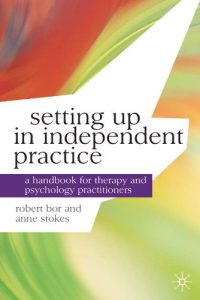Working in independent practice can be attractive to therapists for a myriad of reasons; however, the practical challenges can also seem considerable. How can you negotiate these challenges to build a thriving counselling practice that fits with your personal aims and professional ambitions?
For example:
• What do you need to consider when choosing your practice location?
• Where does marketing and promoting your practice fit in?
• How can you build a support network when working independently?
These questions, and many more, are discussed in this compact guide. Written by two highly regarded authors and practitioners, the book gives hands-on advice and support in planning, setting up and running independent practice.
Packed with tips, tools and practical strategies for you to find your own way of working, the book:
• Explores issues of engaging with clients, from the first client intake interview to practical arrangements for holiday periods
• Discusses managing your finances, including setting fee structures and the pros and cons of doing your own accounts
• Pinpoints risk factors for working in independent practice and discusses practical ways to manage these
• Encourages you to assess your own practice through reflective exercises
An in-depth and practical guide to working independently, this is an indispensable tool for both counselling and psychotherapy trainees considering their career options post-qualification, and established practitioners looking to refine their practice and revisit their skills in light of changing ambitions and circumstances.
For example:
• What do you need to consider when choosing your practice location?
• Where does marketing and promoting your practice fit in?
• How can you build a support network when working independently?
These questions, and many more, are discussed in this compact guide. Written by two highly regarded authors and practitioners, the book gives hands-on advice and support in planning, setting up and running independent practice.
Packed with tips, tools and practical strategies for you to find your own way of working, the book:
• Explores issues of engaging with clients, from the first client intake interview to practical arrangements for holiday periods
• Discusses managing your finances, including setting fee structures and the pros and cons of doing your own accounts
• Pinpoints risk factors for working in independent practice and discusses practical ways to manage these
• Encourages you to assess your own practice through reflective exercises
An in-depth and practical guide to working independently, this is an indispensable tool for both counselling and psychotherapy trainees considering their career options post-qualification, and established practitioners looking to refine their practice and revisit their skills in light of changing ambitions and circumstances.






